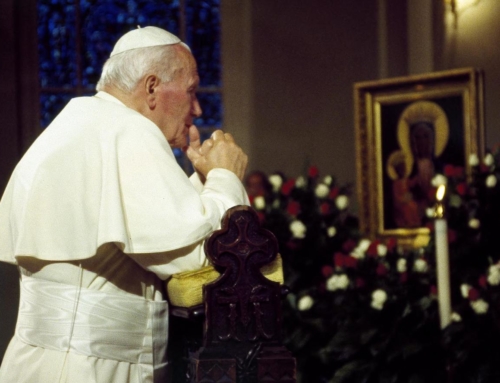By your counsel you will guide me,
and then you will lead me to glory.
What else have I in heaven but you?
Apart from you, I want nothing on earth. (Psalm 73:24-25)
The rails clacked and the din of passengers subsided to a murmur. The soothing noise and drowsy evening light submerged me in a sleepy meditation. I gazed out the window as the red light of the setting sun cast a thousand shadow-crosses upon the rolling hills. My eyes flitted from cross to cross, considering the meaning of the image of a thousand shadows of the cross.
We stopped at that midpoint between cities where as many excited travellers get on as weary workers get off. As the newcomers found their seats, one young woman sat down across from me. She glanced at me and smiled until her eyes darted down to the little white square at my throat. I smiled back and had turned to look out the window again when she said “Oh, are you a Catholic priest?” somehow mixing her indignation with indulgence. Still thinking of the shadows of the cross, I muttered back something about seminarians. With a mortician’s smile, she dropped the dreadful line I’d heard many times: “I grew up Catholic, but haven’t been to Church since I made my Confirmation.” The anticipated other shoe dropped: “Why does the Church say that I can’t…”
***
Christ has always been a sign contradicted. Any Catholic who manifests her faith has been confronted on some controversial teaching. The issue in vogue may change decade to decade, but confrontation has been from the beginning. In fact, Catholic life so challenges the world’s presumptions that Christians living their faith must presume the world’s challenges.
Some friend or passerby will pose his concern about the Church. In the modern era, the matter usually comes down to morals: contraception, abortion, gay marriage, divorce. The Church’s position on these issues strikes a nerve, specifically in those personally affected by them, have friends or family affected by them, or are so formed by the individualism rampant in our culture that they bristle when anyone tells them what to do.
The resulting critique of the Church’s moral teachings, though, starts with the wrong basic principle. The moral teaching of the Church does not spring from a vacuum. The point of the Church cannot be reduced to accusing people of sin.
The point of the Church is Jesus.
The Church is like a mother telling her child “No, you cannot have that soda now” because the mother wants the child to whet his appetite for the succulent and healthful dinner that she will have prepared shortly, after which there will be an even more delicious dessert. The soda passes away, but the sustenance of the feast endures.
The Church does not say “no”, but rather “you cannot have that little thing because we have something much greater for you.”
God in His unfathomable love created you for Himself, to be united to Him in perfect Love and unending Joy. Our little illicit pleasures may be sweet for a time, but like a sugary soda, dissolve away, leaving a bitter taste in our mouth and a desire for something more filling, not to mention the cavities that need filling. These little pleasures are not worthy of our dignity, and by pursuing them, we injure our capacity to experience that greater joy for which He creates us.
God knows these pleasures do not satisfy but wound. And so, in the fullness of time, God came in the person of Jesus to suffer and die, and so to heal us and empower us to return to Him, manifesting His perfect love. Knowing how weak we remain, how attractive pleasures of the world can be, He left a map and compass to Himself in the hands of the Church. With her guidance, we know how to return to God, the fountain of life-giving water, eschewing false satisfaction in bitter soda.
Why does the Church say you can’t? So that, having suffered the little shadow-cross of casting off fleeting pleasures, you might enter into the unending joy of Jesus.
All these little crosses point to Him.
✠
Photo by Brittany Gaiser







